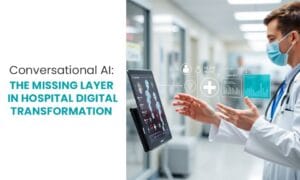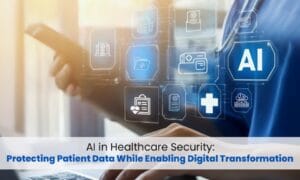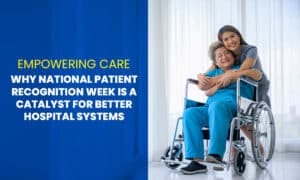
Healthcare is experiencing a remarkable transformation, and at the heart of this change lies Hospital Management Software (HMS). As someone who’s been following this evolution closely, I can tell you that 2025 is proving to be a game-changing year for healthcare technology. The global market for Hospital Management Software (HMS) is expected to grow significantly. In 2023, it was worth around $25 billion. By 2030, it’s projected to reach $50.3 billion. This surge isn’t just about numbers – it’s about making healthcare more accessible, efficient, and human-centred. Today, nearly 85% of hospitals worldwide are embracing digital solutions to enhance patient care and streamline their operations. Let’s explore the five most exciting trends that are revolutionising how hospitals manage their day-to-day operations and care for patients.
1. Artificial Intelligence and Machine Learning Integration
- Smart Workflow Management: AI algorithms now handle complex scheduling, resource allocation, and inventory management, reducing administrative burden by up to 40%.
- Predictive Patient Care: Machine learning models analyse patient data to predict potential health risks and recommend preventive measures with 85% accuracy.
- Automated Documentation: Natural language processing helps convert voice notes to text and automatically updates patient records, saving doctors an average of 2 hours daily.
Remember the days when predicting patient admissions felt like guesswork? Those days are behind us now. AI and ML have become the friendly assistants every hospital staff member relies on.
Take the scenario of Sarah, a nurse manager at a London hospital, who used to spend hours manually scheduling staff shifts. Now, AI-powered HMS helps her create optimal schedules in minutes, considering everything from staff preferences to expected patient loads. The impact is remarkable – hospitals using AI-driven HMS report a 40% reduction in administrative tasks and a 25% improvement in resource allocation efficiency.
2. Telemedicine and Remote Care Integration
- Virtual Consultation Platform: Seamless integration of video consultations with existing patient records, leading to a 60% increase in appointment attendance.
- Remote Patient Monitoring: Real-time tracking of vital signs through connected devices, reducing hospital readmissions by 30%.
- Digital Health Records Access: Secure sharing of test results and treatment plans, enabling better continuity of care across different healthcare providers.
The pandemic changed how we think about healthcare delivery, and this change is here to stay. Modern HMS platforms now come with built-in telemedicine features that feel as natural as making a video call to family. It’s heartwarming to see how this has helped people like elderly patients, who can now have regular check-ups with their doctor without leaving their homes. Statistics show that hospitals with integrated telemedicine solutions have seen a 60% increase in patient satisfaction and a 30% reduction in missed appointments.
3. Cloud-Based Solutions with Enhanced Security
- Scalable Infrastructure: Flexible storage and computing resources that grow with your hospital’s needs, reducing IT costs by 35%.
- Advanced Data Protection: Multi-layer security protocols and encryption ensuring 99.9% data safety compliance.
- Disaster Recovery: Automatic backup systems with 15-minute recovery time objectives, ensuring continuous hospital operations.
Gone are the worries about server rooms and data storage limits. Cloud-based HMS has become the backbone of modern hospital operations, offering both flexibility and peace of mind. It’s like having a secure digital filing cabinet that you can access from anywhere, anytime. The best part? Nearly 75% of hospitals report significant cost savings after switching to cloud-based systems, with an average reduction of 35% in IT infrastructure costs.
4. Patient-centric features and Engagement Tools
- Interactive Patient Portals: User-friendly interfaces for appointment booking and medical record access, increasing patient engagement by 55%.
- Personalised Communication: Automated yet customised appointment reminders and follow-up messages, reducing no-shows by 40%.
- Feedback Integration: Real-time patient feedback systems help hospitals maintain a 90% satisfaction rate.
Today’s HMS isn’t just about managing hospital operations – it’s about creating meaningful connections with patients. From friendly appointment reminder messages to easy-to-use patient portals, everything is designed with the patient in mind. This study emphasizes the strong correlation between patient-centred communication and improved patient engagement, satisfaction, and health outcomes in cancer patients. It highlights the importance of factors like information exchange, doctor-patient relationships, and shared decision-making. It’s amazing how simple digital tools can make patients feel more involved and cared for in their healthcare journey.
5. Smart Analytics and Predictive Capabilities
- Resource Optimisation: AI-powered forecasting reducing emergency response times by 28% through better staff allocation.
- Clinical Decision Support: Data-driven insights improving diagnosis accuracy by 35% and treatment planning efficiency.
- Financial Analytics: Real-time financial monitoring helps hospitals reduce operational costs by 25% while maintaining quality care.
Imagine having a crystal ball that helps you make better healthcare decisions – that’s what smart analytics in HMS feels like. These systems now analyse patterns in patient data to predict everything from potential health complications to peak admission times.
6. Interoperability and Seamless Data Exchange
- Unified Health Records: Implementation of FHIR and HL7 standards enabling seamless data sharing between different healthcare systems, reducing medical errors by 35%.
- Cross-Platform Integration: EHR systems now work harmoniously with HMS platforms, ensuring consistent patient information across all touchpoints.
- Blockchain Integration: Secure, tamper-proof record sharing between hospitals, insurance providers, and patients, with 99.99% data integrity.
Gone are the days of siloed healthcare systems that couldn’t talk to each other. Today’s HMS platforms are breaking down these barriers, creating a unified ecosystem where patient information flows securely and seamlessly. Take the scenario to understand the significance of interoperability and data exchange, of Dr James from Birmingham General Hospital, who recently handled an emergency case for a tourist. Thanks to interoperable systems, he could instantly access the patient’s complete medical history from their home hospital in Manchester, potentially saving precious minutes in critical care. Studies show that hospitals with fully integrated systems report a 45% improvement in care coordination and a 30% reduction in duplicate tests.
7. Mobile-First and Sustainable Solutions
- On-the-Go Healthcare Management: Mobile-friendly HMS platforms enabling 24/7 access to critical information, improving response times by 40%.
- Paperless Operations: Digital workflows reduce paper usage by 85% while cutting operational costs by £50,000 annually per hospital.
- Smart Building Integration: Energy-efficient systems reducing carbon footprint by 30% through automated resource management.
The future of healthcare is not just about treating patients – it’s about doing so responsibly and sustainably. Modern HMS platforms are leading this charge with mobile-first designs that put powerful tools in healthcare providers’ pockets. For instance, Dr Sarah Chen, an emergency physician, shares how mobile access to patient records and real-time updates has transformed her practice: “I can now make informed decisions while moving between wards, and our hospital’s shift to paperless operations means I spend more time with patients and less time filling forms.

Click here to know about the Top 6 Best Hospital Management Software to Check Out in 2025
Final Words
The future of hospital management software is not just about technology – it’s about creating a more caring, efficient, and accessible healthcare system for everyone. These trends show us that while we’re embracing digital solutions, we’re not losing sight of what matters most: the human touch in healthcare. As we continue through 2025, these innovations are helping healthcare providers spend less time on paperwork and more time where it matters most – with their patients.
Whether you’re a healthcare professional, administrator, or patient, these changes are making the hospital experience better for everyone involved. The journey towards more intelligent, connected, and compassionate healthcare continues, and HMS is leading the way forward.
Remember, at the end of the day, it’s not just about the software – it’s about the smiles on patient’s faces when they receive better care, the relief in healthcare workers’ eyes when their workload becomes more manageable, and the satisfaction of knowing that technology is helping us create a healthier world.





